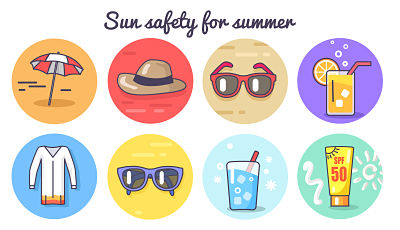
Icons for an umbrella, a hat, men\'s sunglasses, a glass of lemonade, a cover up, women's sunglasses, a glass of water, and sunscreen SPF 50 in eight separate circles under sun safety for summer in black text
Are your eyes and skin naked in the summer?
Summer has arrived. The sun is shining bright and now is the time to make sure you eyes and skin are receiving the care they deserve. We all love to take in those warm summer rays, but everyone must remember to protect their skin and eyes from the damaging effects of the sun.The sun emits radiation known as UV-A and UV-B rays. Both types can damage your eyes and skin with UV-B rays having short wavelengths that reach the outer layer of your skin and UV-A rays penetrating the middle layer of your skin with their longer wavelengths. Some of the things that can unprotected sun exposure can do to you is cause vision problems and damage to your eyes, suppress the immune system, prematurely age your skin and cause skin cancer. By learning the risks associated with too much sun exposure and taking the right precautions to protect you and your family from UV rays, everyone can enjoy the sun and outdoors safely. Fortunately, there are things you can do to minimize the risk that comes with sun exposure.
1. Cover Up: Wearing a Hat (preferably wide brimmed) or other shade-protective clothing can partly shield your skin from the harmful effects of UV ray exposure. Proper clothing may include long-sleeved shirts, pants, hats, and Sunglasses for eye protection.
2. Stay in the Shade: The sun's glare is most intense at midday. Staying in the shade between the hours of 10 a.m. and 4 p.m. will further protect your skin and eyes. The sun can still damage your skin on cloudy days or in the winter. For this reason, it is important to stay protected throughout the year, including wearing sunglasses.
3. Choose the Right Sunscreen and Sunglasses: This is extremely important. The U.S. Food and Drug Administration's (FDA) new regulations for sunscreen labeling recommends that your sunscreen have a sun protection factor (SPF) of at least 15, and should protect against both Ultraviolet A (UV-A) and Ultraviolet B (UV-B) rays. To protect your eyes from harmful solar radiation, you should wear sunglasses that block 100 percent UV whenever you are outdoors in daylight. Your eyes need protection even on cloudy days because the sun's damaging UV rays can penetrate cloud cover. The risk of damage to our eyes and skin from solar UV radiation is cumulative - meaning the danger continues to grow the more time you spend in sunlight throughout your lifetime.
With this in mind, it's especially important for kids to protect their eyes from the sun. Children generally spend much more time outdoors than adults. In fact, some experts say that because children tend to spend significantly more time outdoors than most adults, up to half of a person's lifetime exposure to UV radiation can occur by age 18. Also, children are more susceptible to eye damage from UV rays because the lens inside a child's eye is clearer than an adult lens, enabling more UV to penetrate deep into the eye.
By taking the proper precautions and following this advice you and your loved ones can enjoy the sun. If you are having any problems after being in the sun, be sure to talk to your healthcare provider. Enjoy the outdoors this summer and remember to protect your eyes and the skin you're in!
If you happen to overdo it in the sun, call your local physician or Sabetha Family Practice at (785) 284-2141. Enjoy the sun and cover those eyes.
